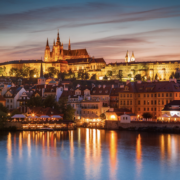Landmarks all over the capital, including Prague Castle, Charles Bridge, Old Town Square, and the Žižkov TV tower, will be going dark between 8:30 and 9:30 pm, to call attention to the looming threat of climate change.
Over a decade later, Earth Hour has become one of the world’s largest grassroots movements focused on saving the environment, celebrated every year on 28 March.
Last year, 10 million people took part in Earth Hour, raising awareness and money for climate and nature initiatives around the world. Cities and towns in 150 countries will be switching off their lights, and Prague is helping to lead the way.
Though the movements of many are limited this year due to recent developments in the spread of the COVID-19 virus, we can all still take part by switching the lights off at home or wherever we are.
The initiative, which was started by the World Wide Fund for Nature (WWF), took root as a lights-out event in Sydney back in 2007. Since then, however, it has grown into one of the world’s largest grassroots environment-focused movements, with millions of people engaging every year.
“Natural systems are vital for all our futures – and yet, the rate of global loss of nature during the past 50 years is unprecedented in human history. Nature not only provides us food, water, clean air, and other services worth over US$125 trillion a year – it is also one of our strongest allies against climate change. Protecting nature is one of the most immediate, powerful, and cost-effective solutions to the climate crisis”, Earth Hour’s official page said in a statement.
Support Prague Morning!
We are proud to provide our readers from around the world with independent, and unbiased news for free.
Our dedicated team supports the local community, foreign residents and visitors of all nationalities through our website, social media and newsletter.
We appreciate that not everyone can afford to pay for our services but if you are able to, we ask you to support Prague Morning by making a contribution – no matter how small 🙂 .




